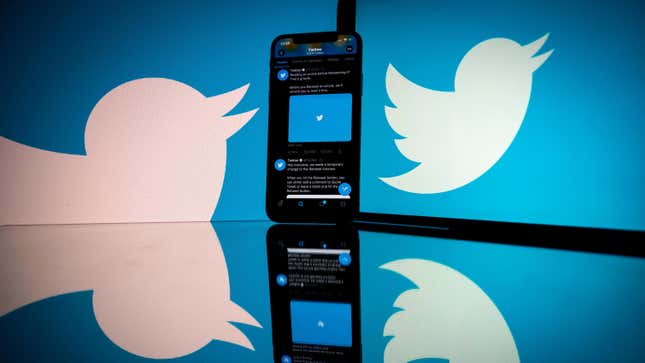
Twitter is floating “early concepts” of new anti-abuse features—such as the ability for a user to untag themselves from another’s posts, or even revoke the ability of another user to tag them entirely.
The new features aren’t set in stone, but concepts tweeted by Twitter privacy engineer Dominic Camozzi tease the idea of an “Unmention yourself from this conversation” button that allows a user to not only stop receiving notifications from a conversation (already possible via the mute button) but remove any link to their profile. Another possible update would allow users to ensure that another who doesn’t follow them never tags them in a post again—they would instead receive a notification that the “[user] can’t be mentioned.” The two features could be linked in some way, providing a quick way for users to tell hostile strangers to go screw off.
According to TechCrunch, other major updates being floated by Twitter include a toggle that would allow users to turn off being tagged in a post for stretches of one, three, or seven days, as well as a tool that would identify situations that may be “escalating further” and suggesting solutions such as turning off mentions. This wouldn’t stop other Twitter users from relentlessly screenshotting a particularly bad tweet or criticizing someone, although it would give whoever is the target of the latest round of Twitter beefing an opportunity to not get a notification every time another rando goes for a dunk.
A Twitter spokesperson confirmed to TechCrunch that Camozzi’s tweets were a “design mock” that remain “still in the early stages of design and research,” though the company is “excited about community feedback even at this early stage.” Numerous issues remain to be sorted out, such as how turning off tagging will affect pre-scheduled or automatically scheduled tweets.
These would collectively constitute some of the bigger anti-harassment updates to Twitter in recent memory. The site has dealt with rampant bullying, hate speech, and overall toxicity for almost as long as it’s been around (a 2016 BuzzFeed article described it as a decade-long “honeypot for assholes”). To a big extent, this is inherent to the way the site works at all—a relatively small group of power users jockeying for attention combined with legions of trolls leads to bad results—but maybe it will make the overall experience more pleasant for users, especially marginalized or vulnerable communities that tend to take the brunt of hate speech.
Twitter has been on a feature roll lately, introducing such things as the ability for users to charge for access to premium feeds and audio chat rooms. In Australia and Canada, it recently began testing Twitter Blue, a $4.99 premium account service offering features such as a 30-second window of opportunity to retract tweets, condensed threads, and bookmarking and organization tools. The company also recently relaunched its system for users to request “verified” status on the site, which had been shut down for four years after its staff’s decision to verify a number of high profile white supremacists and neo-Nazis backfired.





